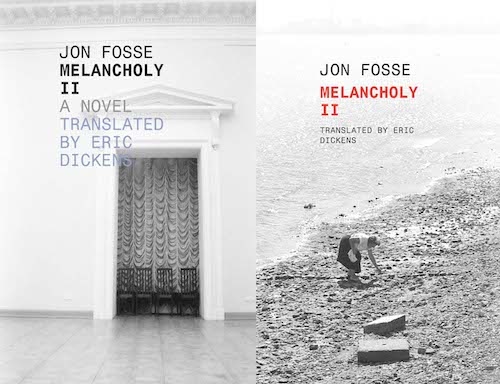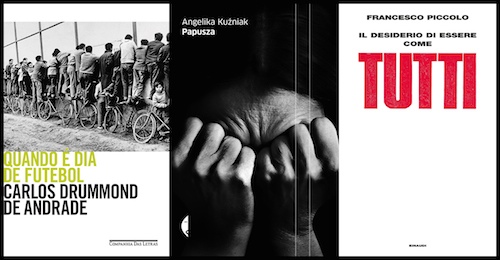Canadian author Margaret Atwood is known for her take on speculative fiction, and her latest op-ed-cum-fiction piece proves no exception: in it, she imagines what the Arab-Israeli conflict would look like to a Martian. Similarly problematic is the imminent republication of Adolf Hitler’s autobiography, Mein Kampf. At the New York Times, Peter Ross Range reflects on what it means for Germany to have the book in circulation for the first time since the end of World War II. READ MORE…
Monthly Archives: July 2014
Weekly News Roundup, 11th July 2014: Pet peeves, Tyra Banks, PEN awards

This week's literary highlights from across the world
In Review: Melancholy II by Jon Fosse

"In the end just one word is left of the poem: 'wide-screen sky.' But that word, Fosse tells a distraught Knausgaard, is a good word."
Once upon a time, and a very good time it was, a friend of a friend was sitting on a park bench with a book. This friend—a student of literature—was reading modern Norwegian drama, and the park bench she was sitting on was right by the theater in Bergen. It was also right by a large and imposing statue of Henrik Ibsen.
As she sat there reading, a heavy figure approached, dressed in black. He lumbered closer and finally sat down on the other end of her bench, musing into the air, saying nothing, as my friend read her book. Or rather, as she pretended to read her book, and just sat there quaking, reading Fosse while Fosse sat on the other end of the bench, the two of them watched over by a furious-looking stone statue of Ibsen. After a while, Fosse got up and wandered on. My friend sat there for a while and collected herself, then went to a lecture.
What We’re Reading in July

Summer lit picks from the Asymptote team: Italian fiction galore, poetry for the World Cup, and a Romani and a German writer
Antony Shugaar (editor-at-large, Italy): I’m reading the shortlisted books for Italy’s top literary prize, the Strega (named after a saffron-yellow after-dinner liqueur), which were announced in early July. One of the most interesting is Il desiderio di essere come tutti, The Desire to Be Like Everyone Else (Einaudi) by Francesco Piccolo, which amounts to a psychic autobiography of the past 40 years of Italian life, and the transition from a time of communist ideals to the present. Suffice it to say that the book is broken down into two parts: 1) The Pure Life: [Italian Communist Party leader Enrico] Berlinguer and Me and 2) The Impure Life: Berlusconi and Me. And I’m pleased to say, it was the winner.
Translation Tuesday: Poetry by Nala Arung, translated by Tiffany Tsao

"Who would have guessed that love would collide / Into the wall that is FPI."
Efpei I’m in Love by Nala Arung
The cover of Efpei I’m in Love, a poetry collection by Indonesian writer Nala Arung, announces that it is “a book of tasteless poetry.” And it is apparent from the outset that its tastelessness operates on multiple levels.
Its title is deliberately lowbrow—a take on the title of the wildly popular teenage chick-lit novel, Eiffel … I’m in Love, published in 2001 and adapted for film as a romantic comedy of the same name two years later.
The Efpei that has displaced the original Eiffel refers to the FPI, or Islamic Defenders’ Front. A hard-line Islamic vigilante organization, FPI has gained national notoriety for using violence to enforce their interpretation of Islamic law. Its members often patrol areas for signs of un-Islamic activity, destroying property and beating up offenders. The organization has also attacked religious minorities, including Buddhists, Christians, and Ahmadi Muslims, whom they consider a heretical sect. FPI is certainly no laughing matter and hardly the stuff love poems are made of—or so it would seem until one reads the titular poem “FPI, I’m in Love.” READ MORE…
Torquemada Paxman and the Poet-Heretics of the Catholic-Readers’ Church

"An educated amateur could judge a fiction contest and raise no eyebrows." Why isn't this true for poets?
“I think poetry has really rather connived at its own irrelevance and that shouldn’t happen, because it’s the most delightful thing,” said Paxman. “It seems to me very often that poets now seem to be talking to other poets and that is not talking to people as a whole.”
Jeremy Paxman has touched a nerve with his proposal to drag poets before a new Torquemada. But inquisitors toss accusations as predictably as tomatoes hurled by audiences. We poets learned long ago to perform behind thick glass barriers.
Weekly News Roundup, 4th July 2014: Football fandom, 50 poems of love

This week's literary highlights from across the world
If you’re in the United States: Happy fourth of July! Same goes to our readers elsewhere, though the fourth might be happy for different reasons…
Americans mourning a soccer loss: what a novel idea! Here’s how the United States turned a corner in football fandom. Sports aren’t really our thing, though: we’re more into Three Percent’s ongoing World Cup of Literature project, or Electric Literature’s suggestion to read a book for every remaining World Cup team. READ MORE…
“For a long time, I went to bed early.”
With these words (in Lydia Davis’s translation), Marcel Proust began his exploration of memory and perception now known as In Search of Lost Time, formerly titled Remembrance of Things Past.
The two titles bookend a similar concept: was he actively seeking time that had somehow escaped, or was he more calmly remembering things that were simply no longer? Or was he splitting the difference: thinking his way out of the mirror dividing the two positions?
The past, it is said, is another country. Is translation, then, a form of time travel?
Translation Tuesday: “The Imaginary Pet,” “On Dragons”

Surreal tales from Mexican author Cecilia Eudave, translated by criticism editor Ellen Jones
The Imaginary Pet
As I was drinking my tea and noting the unique colour of the jacaranda tree, I was struck suddenly by a sad, painful memory: my first pet. She wasn’t cruel or aggressive, quite the opposite, she was a sweet creature, delicate and extremely intelligent (she taught me to read), with a slender body the colour of a jacaranda, so skinny she could have passed for a bookmark. She was my best friend, she went with me everywhere, slept in my bed, came out with me in my bag, played games with me, sang me to sleep. She always kept watch over my dreams, and with her by my side no nightmare ever dared enter my head.


